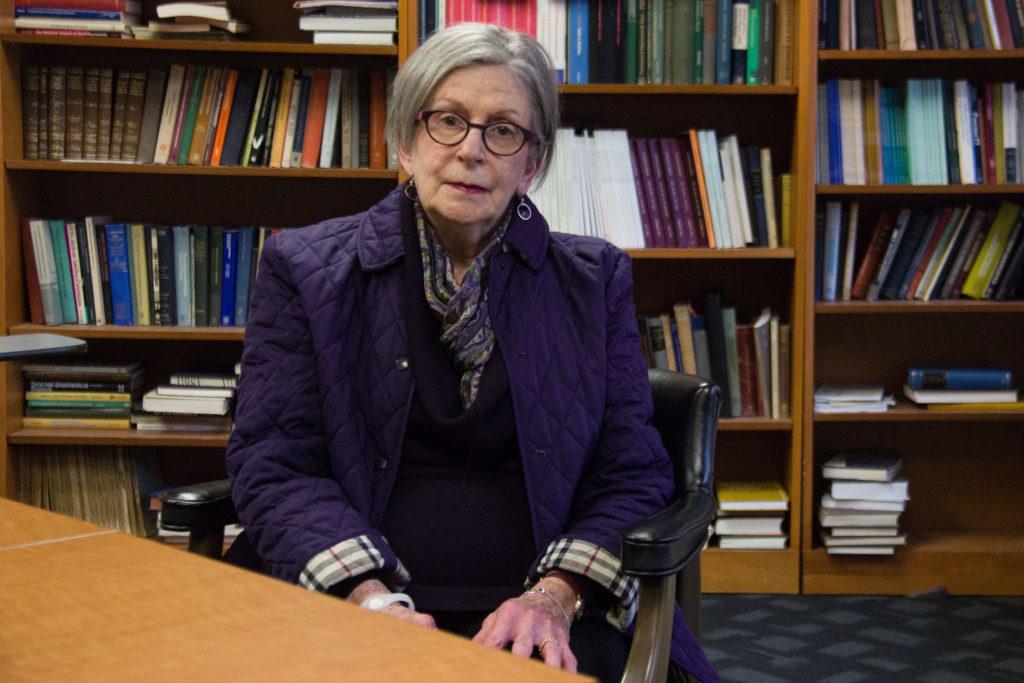For some students on campus, their childhood is featured in history books.
Gina Wasserman, David Callet and Alan Ingber have lived through many of the decades they’re now studying. The students, who are all older than 65 years old, are auditors who came back to school to continue learning without the pressure of grades and GPAs to bog them down. As auditors, these students are among the 434 non-degree seeking students who sit in on classes for a lower cost without taking exams or writing papers.
Many of them are almost a half century older than the students that sit around them in class. With wrinkled skin and more experience than most of their peers, the students said they can feel out of place at times, but like the opportunity to work with younger classmates.
These are the stories of a few non-traditional senior students:
‘Best of both worlds’
David Callet graduated from GW’s law school in 1973. Now 45 years later at 69 years old, he returned this spring for his first semester back in school. Callet sits in on two courses, The Sixties in America and Media and Politics.
Coming back to school is something Callet always wanted to do, but it wasn’t a possibility until two years ago. He worked as a lawyer his entire life and started his own firm in D.C. in 2016, allowing him to finally have control of his own schedule and return to GW.
“I like to learn, I like the concept of being in an academic setting without the pressure of taking tests and writing papers, so it’s sort of the best of both worlds,” Callet said.
In his The Sixties in America class, he’s discussing activism on college campuses from a time when he was at Pennsylvania State University living the experience. Many historical events that he discusses in class – like the election of former President John F. Kennedy and the Vietnam War – are times he remembers vividly.
“In the 1960s class, I’m reliving a lot of my formative years,” Callet said. “I’m listening to and being reminded of things that were very important to me in my high school and college years.”
Callet has found that a lot has changed around GW since his days as a law student. On top of changes to campus, his outlook has shifted and he’s more interested in what the students have to say than when he was their age.
“I participate, but I try to avoid dominating the discussion,” he said. “In the politics and media class, we’re talking about Supreme Court cases that I’m quite familiar with and I don’t want to make it all about me, I want to know what they have to say.”
‘I lived through it’
Alan Ingber, 72, is auditing a history of law course and a film course. He worked as a tax attorney for 40 years and served as vice president and managing director at Citigroup, but is now retired. About four years ago, he returned to the classroom for the first time since 1971 and hasn’t left.
“I retired and was looking for something to do,” Ingber said. “They have these classes that interest me and it really fills up my time. I love it.”
Ingber rolls into classes in the School of Media and Public Affairs building twice a week in an electric wheelchair. When he struggles to get through doors or elevators, Ingber said his younger classmates go out of their way to help.
He went to Miami University for his undergraduate degree and did a year of law school at Washington and Lee University before joining the army in 1967 during the height of the Vietnam War. He then returned to law school and finished by taking night classes.
“I swore I’d never step foot in school again, ever. I avoided it very strenuously my whole life,” he said. “Now I’m in a time in my life when I can just go to get knowledge in an area I like, and it’s great.”
Some of the best relationships he has formed on campus have been with international affairs professors that he didn’t always agree with.
“We had different viewpoints and we would go at it. That was fun,” Ingber said. “I don’t know if she enjoyed it, but I did.”
He tries to keep his course choices diverse, focusing on subjects he may find interesting but never took before, although some of them overlap with his life experience.
“In one class, History of the Cold War, we’re talking about the Cuban Missile crisis as ancient history, and I lived through it,” he said.
‘Keeps your mind young’
Gina Wasserman, 69, came to the U.S. 20 years ago as the wife of the Costa Rican ambassador to the United States. After years in the diplomatic world, former GW president and family friend Stephen Joel Trachtenberg convinced her to go back to school.
She received her master’s degree in British literature from GW in 2005 and continues to take classes today. She kept in touch with a professor who invited her to audit their Jewish literature class in 2013, and has been taking one to two classes each semester since.
“I was always the oldest in the class,” Wasserman said. “I was more part of the group when I was a student, now I’m more separated in a way.”
She said she mainly sticks to her favorite subject, literature. This semester, she is auditing a course on 18th-century Caribbean literature called Pirates, Slaves and Witches.
“My mind needs it,” Wasserman said. “I told myself if I don’t do this I’m going to go crazy.”
She said she often speaks up in class and spends hours conversing with professors, but has found it harder to connect with students. Many of them see her as “their grandmother,” she said.
“It’s been very fulfilling,” Wasserman said. “If you’re surrounded by young people, it keeps your mind young.”




